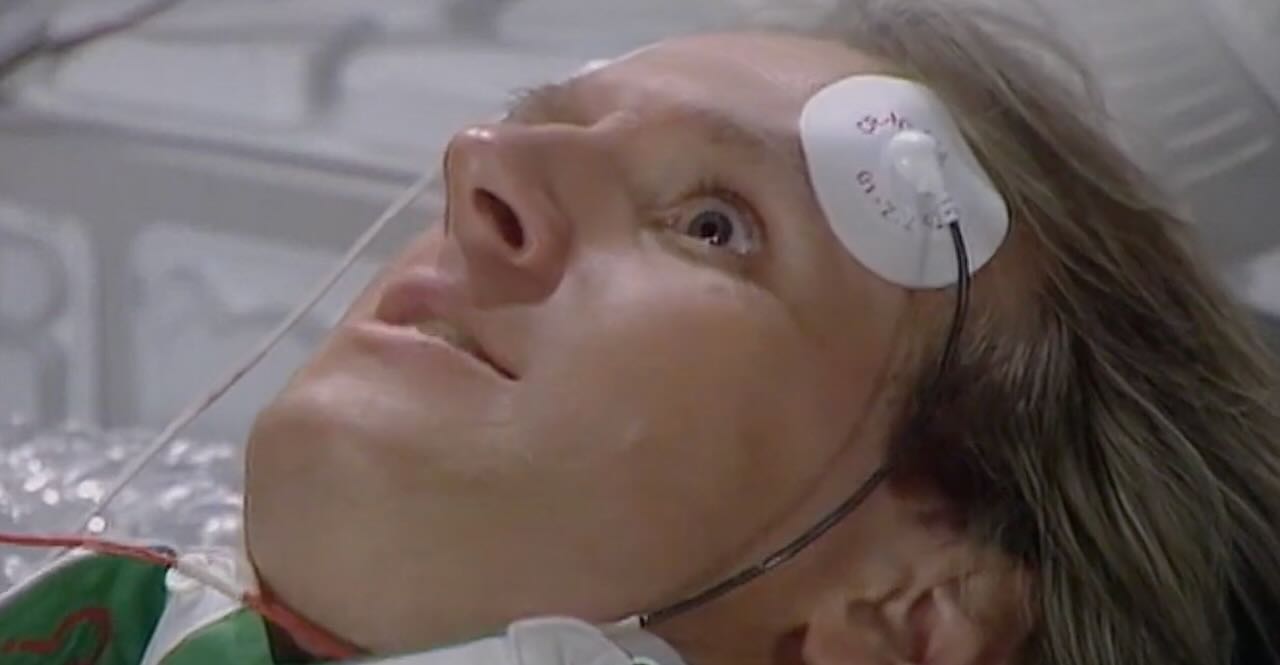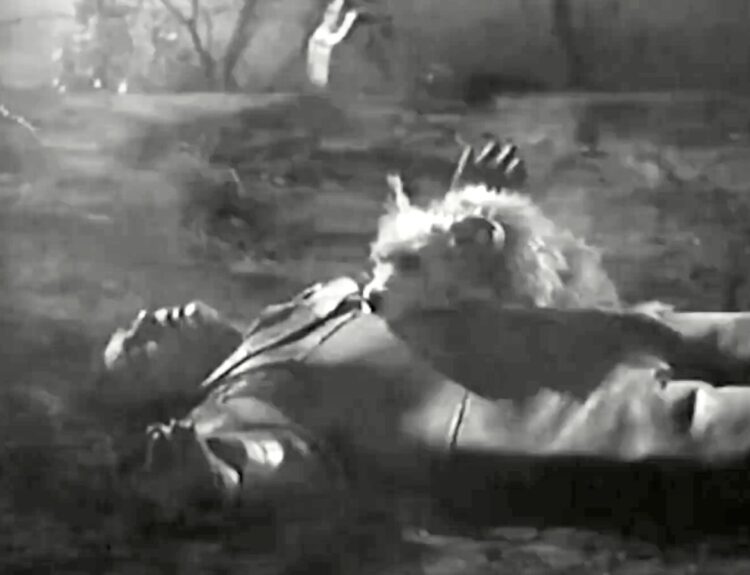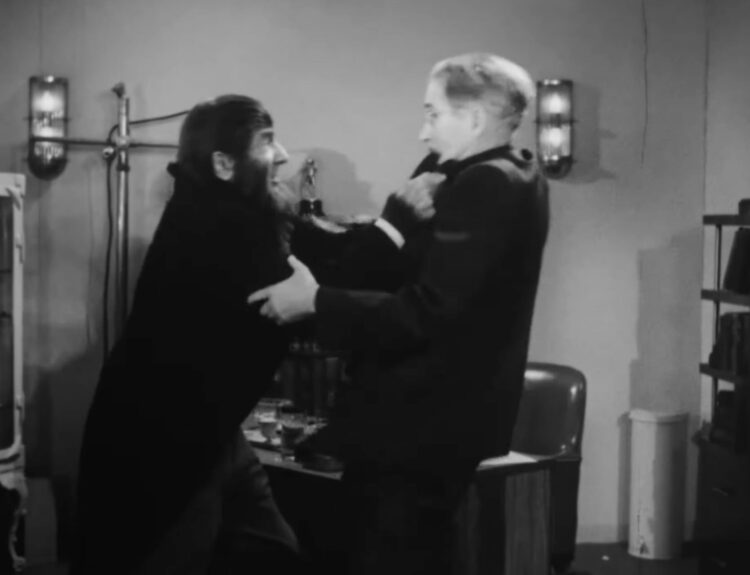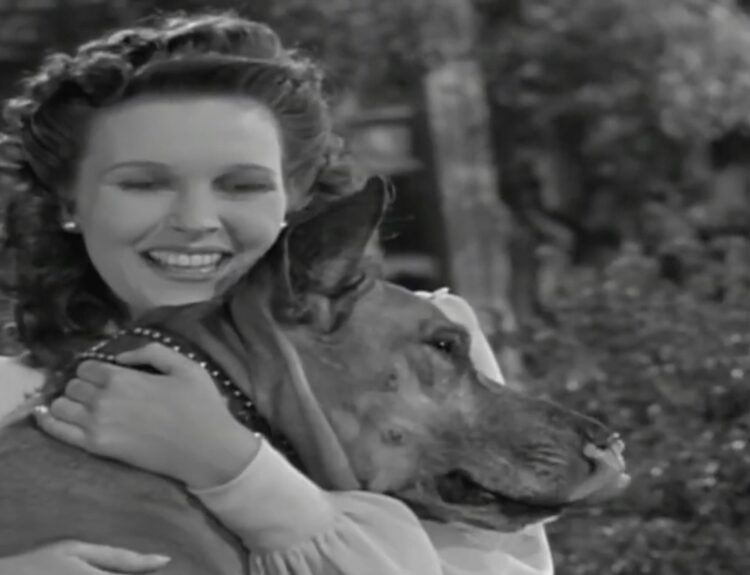Doctor Who has long been my favorite show, but it’s been a couple of years since I’ve actually watched anything but the newest episodes. Before that, I was making a respectable run at getting through the original series, most of which I haven’t seen for decades. For various reasons, lately it has felt like it’s time to get back into it.
Resurrection of the Daleks
Starring Peter Davison as the Fifth Doctor.
Companions: Janet Fielding as Tegan Jovanka and Mark Strickson as Turlough.
Written by Eric Saward. Directed by Matthew Robinson. Produced by John Nathan-Turner. Script Edited by Eric Saward.
Format: 2 episodes, each about 45 minutes long
Originally Aired: February 1984 (Episodes 11-12 of Season 21)
Resurrection of the Daleks was the first time ever that Doctor Who was aired in (roughly) 45 minute long episodes, a practice which became the norm in the following season, and then again in the revived series. However the story wasn’t produced this way–the episodes were adjusted to make room in the BBC’s schedule for the 1984 Winter Olympics.
Spoilers Ahead!
Resurrection of the Daleks is a story with a lot going on.

There are lots of characters running around. Some of them are Daleks, loyal to the Dalek Supreme. Some of them are other Daleks who are loyal to Davros. Some of them are soldiers, who are really Dalek-created duplicates, loyal only to Daleks. Some of them are the crew of a medical ship that was transporting Davros, trying mostly to kill Davros. Some of them are soldiers from earth, just trying to do the right thing. Some of them are Dalek-created duplicates of those earth soldiers. And almost all of them are shooting at each other with guns.
Story-wise, these various bands of characters get slotted into a few different competing plots. The Daleks want Davros to help him cure the Movellan virus that lost them the war we saw a glimpse of in Destiny of the Daleks. At the same time, the Daleks have set a trap to capture the Doctor, so they can create duplicates of him and his companions, so that they can use them to go Gallifrey and assassinate the High Council of the Time Lords. They’ve got other duplicates functioning as a human troopers, under the command of a mysterious guy named Lytton, to help them capture Davros, and also look after canisters of the deadly virus (for some reason, to be kept in an abandoned building on earth).

They create even more duplicates to take the place of the human bomb squad soldiers who investigate the canisters, so they can guard them. They use a time corridor to lure the Doctor to that same part of earth, and have another duplicate planted there ready to ask him for help, in order to capture him. Lytton also has a couple of henchmen on earth pretending to be policemen, to facilitate all of the above. And when all is said and done, Lytton just straight-up murders one of his own troopers, just because, though not his policemen henchmen.
And while all this is going on, Davros is planning on using that same virus that he’s been retrieved to cure to kill most of the Daleks, so that a new breed, loyal only him, will dominate. He’s created some kind of will-sapping drug that works on humans and Daleks alike, to grow his own personal army. And the survivors of the crew of the medical ship that was transporting him are running around trying to find some way to blow up their own ship, to kill Davros, and of course are opposed on every side.

So like I said, it’s a lot. Too much, really. The action and the various set-pieces are well-paced, but the story is spread too thin.
By far the biggest offender is the whole “Daleks creating human duplicates” story thread. The idea that while they are facing the existential threat of the deadly Movellan virus, the Daleks have also intentionally lured the Doctor into heir midst just seems ludicrous. The revelation that they intend to copy the Doctor in order to kill the Time Lords is abrupt and out of nowhere. Even less meaningful is the idea that they’ve also sent a whole bunch of duplicates to take positions of influence in human society (what for?!), and the fact that the Doctor is flippantly confident that all them will eventually rebel against their programming, just as Stein (barely) did, makes the whole thing seem severely underwritten.

What is especially annoying is the fact that it’s so unnecessary. This is already a story that features Davros using a mind-control drug to get Daleks and humans alike to serve him. Why not just make that part of the Dalek plan instead? The Daleks could have been trying to brainwash the Doctor instead of duplicating him, and Stein and the other troopers could have just been brainwashed tool, rather than both duplicated and brainwashed. Leave out the duplicates on earth entirely and the story would be far less stretched thin.
Resurrection of the Daleks one of the most violent Doctor Who stories ever–apparently the on-screen death count gets up to mid 70s. As such, it’s certainly exciting, with loads of high-stakes action. But sometimes, it does become a bit much. There’s a random bit with some crew members on the medical ship getting infected with some disfiguring disease that adds nothing but some extra gruesomeness to the story. There are a fair few Dalek mutants writhing and hissing to death when their casings get blown up. And some of the characters like Professor Laird and the duplicate of Colonel Archer have death moments that are extremely loud and over-the-top.

But having said all that, this relentless, death-filled tone does fit with Tegan’s decision to leave at the end of the story. It’s an interesting choice to have a character leave not because they are moving on to something more fulfilling, but just because she cannot stand it anymore.

And there’s not as much focus on this as there should be, but it works that part of that disgust is that even the Doctor was willing to kill his enemy even if he (predictably) fails. Janet Fielding and Peter Davison play this scene well, and for once the fact that a character’s departure comes as a surprise to the Doctor makes sense.

In addition to this moment, there was a lot that I enjoyed in Resurrection of the Daleks. Matthew Robinson’s direction and Eric Saward’s scripts keeps the story clear and engaging, which is especially impressive considering all the story clutter I’ve mentioned. There’s a lot of tension in all the goings-on, with things like Osborn’s doomed attempt to kill Davros, Style’s doomed attempt to blow up the ship, and Stein’s final victory over the Daleks and his conditioning to blow up the ship. The production design is good and the effects are great when compared to most of the series. I also enjoyed Rodney Bewes’ performance as Stein, even though the set-up to the reveal that he was a Dalek agent was not believable (little of his behavior in the early part of the story seems consistent with this).

Resurrection of the Daleks introduces Maurice Colbourne as Lytton, a character I don’t really know what to make of. He leads a troop of Dalek duplicates but doesn’t seem to be one himself, and with his murder of his own guy at the end seems to have his own agenda going on. I’ll probably watch Attack of the Cybermen next to see if I can make any sense of it. But there is no denying that Colbourne is good at the part, and brings a lot of gravity to the role.
The story also introduces Terry Molloy as the show’s third take on Davros. It’s hard to compare anyone to Michael Wisher’s original performance in Genesis of the Daleks, but Molloy is quite good in the part and it works for the show that he continued in the role for the rest of the classic series, as well as in Big Finish. His Davros is certainly unhinged and maniacal, and is a big improvement over what we had in the previous appearance in Destiny of the Daleks.

So on balance I liked Resurrection of the Daleks a fair bit, even though I’m glad that Doctor Who doesn’t always try to chase the “action movie” vibe that this serial is going for. The story’s brutality kinds of wears you down, especially when all of the sympathetic characters just get brutally and often unceremoniously killed, but it all pays off with Tegan’s abrupt farewell. The story itself is gripping and fun and never dull, which is not something you can always say about Doctor Who.

Other Thoughts
• During the Doctor’s duplication process there is a montage of clips from the series which feature all the previous Doctors and all the companions, except for Leela (who was intended to be there but was left out by mistake) and Kamilion, if you count him, who was apparently never meant to be included.
News
Berita
News Flash
Blog
Technology
Sports
Sport
Football
Tips
Finance
Berita Terkini
Berita Terbaru
Berita Kekinian
News
Berita Terkini
Olahraga
Pasang Internet Myrepublic
Jasa Import China
Jasa Import Door to Door



